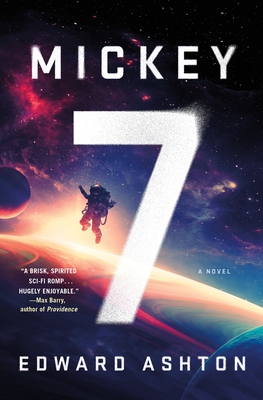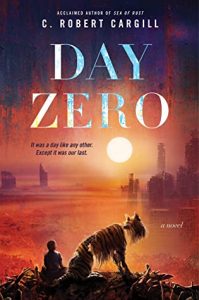 Mickey7 by Edward Ashton
Mickey7 by Edward Ashton Format: eARC
Source: supplied by publisher via Edelweiss
Formats available: hardcover, ebook, audiobook
Genres: science fiction, space opera
Pages: 304
Published by St. Martin's Press on February 15, 2022
Purchasing Info: Author's Website, Publisher's Website, Amazon, Barnes & Noble, Kobo, Bookshop.org, Better World Books
Goodreads
Mickey7, an "expendable," refuses to let his replacement clone Mickey8 take his place.
Dying isn’t any fun…but at least it’s a living.
Mickey7 is an Expendable: a disposable employee on a human expedition sent to colonize the ice world Niflheim. Whenever there’s a mission that’s too dangerous—even suicidal—the crew turns to Mickey. After one iteration dies, a new body is regenerated with most of his memories intact. After six deaths, Mickey7 understands the terms of his deal…and why it was the only colonial position unfilled when he took it.
On a fairly routine scouting mission, Mickey7 goes missing and is presumed dead. By the time he returns to the colony base, surprisingly helped back by native life, Mickey7’s fate has been sealed. There’s a new clone, Mickey8, reporting for Expendable duties. The idea of duplicate Expendables is universally loathed, and if caught, they will likely be thrown into the recycler for protein.
Mickey7 must keep his double a secret from the rest of the colony. Meanwhile, life on Niflheim is getting worse. The atmosphere is unsuitable for humans, food is in short supply, and terraforming is going poorly. The native species are growing curious about their new neighbors, and that curiosity has Commander Marshall very afraid. Ultimately, the survival of both lifeforms will come down to Mickey7.
That is, if he can just keep from dying for good.
My Review:
At first, Mickey7 feels like it’s being played for the laughs. And it is. But it also isn’t. And thereby, as the saying goes, hangs a tale.
When we first meet Mickey, he’s in his seventh iteration as his colony’s one and only “Expendable.” It’s Mickey’s job to go out and die, and he’s about to do it again. Hence his designation as “Mickey7”.
Mickey Barnes contracted with the colony ship out of desperation, to leave his home planet. The problem with being as desperate as Mickey was is that when you’re all out of options you’re left with damn few choices. In this case, only one. He can either stay on Earth and die at the hands of the gangsters who are chasing him – or he can join the crew headed off to Niflheim to die over and over but rise, not out of his own ashes but out of a combination of advanced 3D printing and memory uploading in a new body while still feeling more or less like his old self.
But Mickey7, after several previous “rebirths”, doesn’t hold his own life nearly as cheaply as his crewmates do. He has learned that coming back from the dead is no fun at all and he’d rather avoid it if at all possible.
His current mission looks like an unrecoverable failure to his supposed “best friend” who just plain does not want to go to the trouble of searching for Mickey7 on this hellish iceball of a planet. In spite of the odds, Mickey7 gets himself out of the frozen pickle he’s been dropped into, but when he returns to base he learns that his so-called friend has already reported him dead.
Mickey8 has already been created in a struggling colony that literally isn’t big enough for the both of them. There’s not enough rations to feed two Mickeys. One of them will have to go.
But neither of them wants to.
And that’s where things get both comedic and interesting. In the sense of the old SFnal movie Multiplicity, where Michael Keaton clones himself and all the clones are a bit different. Mickey8 is a bit of a user and a slacker, especially in comparison to Mickey7. His clone is his own worst enemy – and too many people are starting to notice.
One or both of them are going to end up in the recycler if this keeps up. Unless they put their heads together and find another way.
Escape Rating A-: While the opening leads the reader to take the story as a bit of a joke, once it gets going it’s clear that it’s not. At all. Not that there aren’t some funny bits – especially when the Mickeys are arguing with each other – but the story overall pokes at a whole bunch of serious issues. It’s just that the “spoonful of sugar” of the humor makes the lessons go down a bit more easily.
The issues that the story raises call back to a lot of things that are often glossed over in SF, so when they hit they hit with a bit of a punch. Mickey, all the Mickeys, raise questions about what it means to be, not necessarily to be human but to be a person. A self-aware, sentient, sapient being.
 Mickey’s issues are the same ones dealt with in Day Zero, where the robots grapple with their personhood vs. their programming, wondering “if this unit has a soul”. Both Mickey7 and Day Zero reference the famous problem in the metaphysics of identity known as the “Ship of Theseus”. The question of whether an object that has had all its components replaced remains fundamentally the same object – or not.
Mickey’s issues are the same ones dealt with in Day Zero, where the robots grapple with their personhood vs. their programming, wondering “if this unit has a soul”. Both Mickey7 and Day Zero reference the famous problem in the metaphysics of identity known as the “Ship of Theseus”. The question of whether an object that has had all its components replaced remains fundamentally the same object – or not.
At the same time Mickey7 is wrapped around the central issue of the Star Trek: Next Generation episode “The Measure of a Man” which premiered OMG 33 years ago this week. It’s the one where Data’s personhood is put on trial. Is he an object to be owned because he was constructed rather than born? Is he a slave to be exploited? Or is he a person in his own right – with his own rights? Those same questions apply to the Mickeys every bit as much as they do to Data.
But this is a colony story, and it deals a bit, although not in as much depth, with the questions that colony stories often gloss over. It’s not fictionally possible – and it’s not likely possible in reality when we get there – that all the “golden worlds” that colony ships set out for are actually going to be golden. And that it’s not going to be half as simple and easy to fix what’s wrong as it turns out to be in Mass Effect Andromeda – for certain very dangerous and strenuous definitions of “easy”. Niflheim is one of those worlds that may not ever be truly viable. And it’s not going to be a quick and easy solution – or even a quick and painful massacre – for that situation to be resolved one way or another. The terrible slog of trying to make it work is more painfully evident here than we usually see in colonization SF.
As heartbreaking as the colony’s inevitable failure might be, the situation they are in also addresses an issue that usually gets swept away by “manifest destiny” and/or scenarios where planets were seeded with humans by a divine or omnipotent or extremely technologically advanced species so that questions of adaptation and cultural repression can get swept under the carpet.
Instead, we have a situation that, oddly enough, resembles the Star Trek Next Gen episode “Home Soil”, where there is life on Niflheim, it looks nothing like us, acts nothing like us and communicates nothing like us. (In that episode, the silicon based life referred to humans as “ugly bags of mostly water”. Which is technically true in all its parts.
It’s the ugly that gets displayed in Mickey7, as the commander of the colony plans to pretend the discovery never happened – and commit genocide if necessary to ensure that no evidence is left behind. That the Mickeys come up with an ingenious solution to the problem that relies on their dual nature is what redeems this story from farce to something a whole lot more thoughtful and interesting.
And yet never negates the fact that the thing is a whole lot of hair-raising fun to read!

















